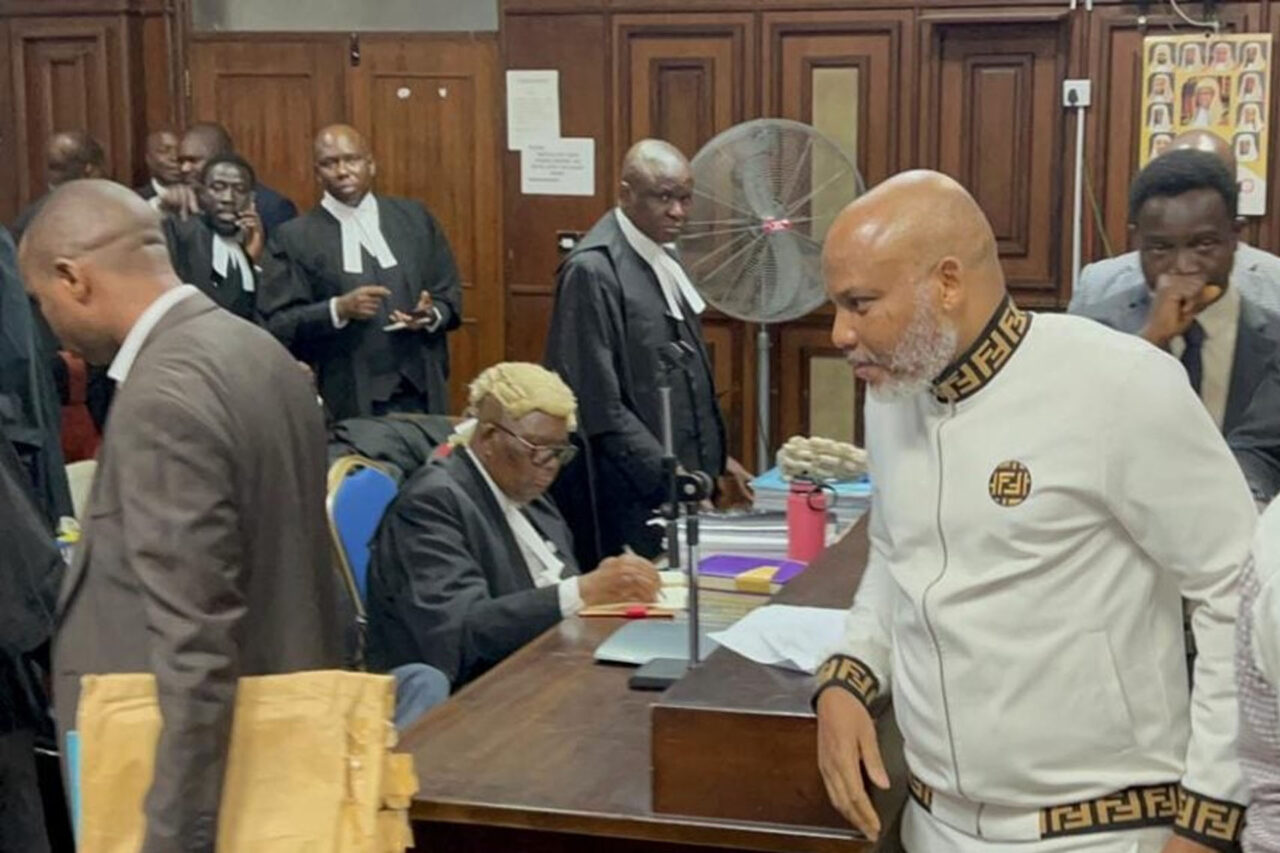A Federal High Court has found Nnamdi Kanu, leader of the proscribed Indigenous People of Biafra (IPOB), guilty on all seven terrorism charges brought against him by the Federal Government.
Justice James Omotosho, who delivered the verdict on Thursday, ruled that the prosecution had “successfully established every allegation” against Kanu.
Justice Omotosho pointed out that Kanu offered no credible defence and “deliberately refused” to challenge the prosecution’s evidence. He described him as “a person who cannot be allowed to remain in the company of sane minds.”
Rejecting Kanu’s longstanding claim to be a freedom fighter, the judge declared that: “Any self-determination not done in accordance with the rules and laws of the country is illegal.”
Justice Omotosho further held that Kanu pursued his agitation through “brutal force and terrorism”, leading to the “bloodshed of innocent citizens.”
He also lauded the prosecution’s witnesses, saying they were “witnesses of truth” despite aggressive cross-examination.
Upon conviction, Kanu was sentenced to life imprisonment for counts one, two, four, five, and six of the seven-count charge.
On count three, relating to membership of a proscribed terrorist organisation, he imposed a 20-year jail term without an option of fine. For count seven, the unlawful importation of a radio transmitter, Kanu received a five-year sentence with no option of fine.
Justice Omotosho noted that though the law permitted a death sentence on some of the counts, he opted for a lighter punishment.
“As a Christian,” he said, “I chose to be merciful to the defendant.”
He ordered that Kanu be kept in protective custody in a secure location outside Kuje Correctional Centre, citing previous jailbreaks. The radio transmitter seized from him, known as Tram 50L and allegedly smuggled into Nigeria in 2015, was forfeited to the Federal Government.
Kanu Removed from Courtroom
Kanu had an outburst in court shortly before sentencing. He grew ‘unruly’, raised his voice, accused the judge of bias, and insisted that the court could not proceed because he had not filed his final written address.
He reportedly told Justice Omotosho that the court “did not know the law.”
The judge subsequently ordered security operatives to remove Kanu from the courtroom and continued delivering the judgment in his absence.
FG Seeks Death Penalty
Immediately following Kanu’s conviction, the Federal Government, through its lead counsel Adegboyega Awomolo, SAN, urged the court to impose the death sentence.
Awomolo argued that Kanu’s broadcasts had led to the deaths of security operatives and destruction of public property, and that imposing the maximum punishment was necessary to deliver justice.
Awomolo told the court: “My lord should consider the nature and gravity of acts of terrorism committed by the convict, which were against innocent Nigerians who reside in the South East.”
He further claimed that Kanu had shown no remorse, saying “his conduct before the court was marked by arrogance.”
He also requested that the court: forfeit all broadcast equipment seized from Kanu, restrict his access to digital devices and the internet while in detention, and ensure he is held in a high-security facility, not Kuje Prison, for his own safety.
10-year Trial Comes to an End
The judgment brings to a close a legal battle that began in 2015, marked by Kanu’s multiple arrests, escape from Nigeria, re-arrest in 2021, and a series of high-profile court appearances and appeals.
The IPOB leader has denied wrongdoing throughout the case, maintaining that his agitation was lawful.
The Attorney-General’s office welcomed the ruling, saying it signalled the government’s “zero tolerance for terrorism.”
- Tinubu Welcomes Egbetokun’s Resignation, Appoints Tunji Disu as Acting IGP - February 25, 2026
- Tinubu Welcomes Egbetokun’s Resignation, Appoints Tunji Disu as Acting IGP - February 25, 2026
- Paris Saint-Germain’s Achraf Hakimi to Stand Trial over Rape Allegation - February 25, 2026

